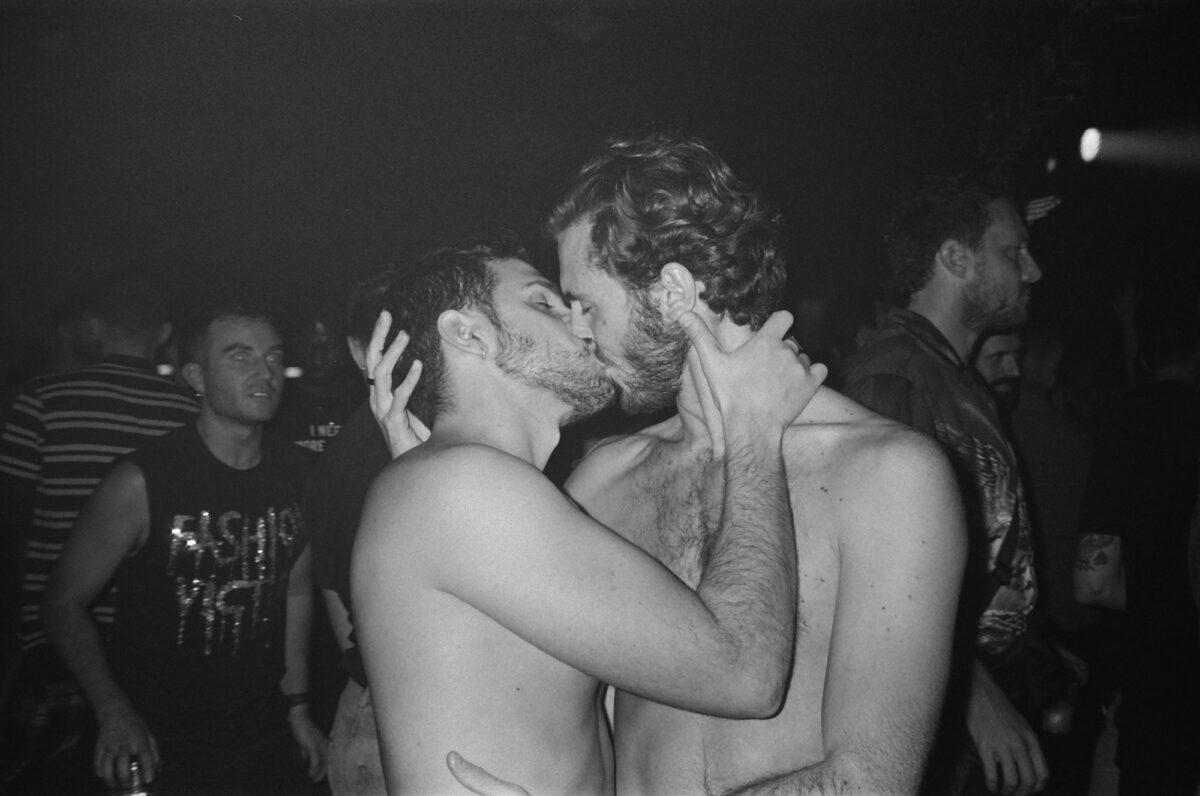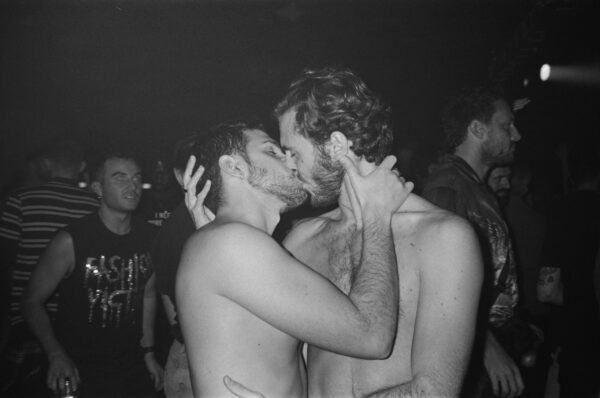
Rethinking identity and recreating our lost realities by Antonio Rodríguez Molina
was first published in https://metalmagazine.eu/
“Why are you so obsessed with this?” someone in my family asked me a year and a half ago. I was lying on the sofa at my mother’s house watching a video on my smartphone. It was a frame-by-frame close-up of the security camera that recorded the murder of Samuel Luiz in La Coruña’s streets, after leaving a bar on a night out with his friends. I was very angry about it and the question made me even angrier. I couldn’t articulate it at the time, but I wanted to reply that it was part of my culture. It’s not that we are obsessed with LGBTQI+ stuff, it’s that we need to go through this and millions of other experiences to dismantle and then reassemble our (mostly) broken worlds.
 “My life here is queer because I worked hard to be the way I wanted to be, different from the heteronormative world, the one we learnt at school of what a normal life should be like,” explains Jorge Garriz, director of the Festival of Queer Spanish Literature in London. The second edition of this event was held from October 1-3 in various venues across the city of London. It only makes sense that someone like Garriz, who has deconstructed his own experience as a queer person in this world, is at the helm of a festival that shares the most recent queer literature written by authors from the Spanish territory and authors in the United Kingdom. This is not a promotional exercise, nor a mere cultural festival. Beyond its programming, there is an intention to gather experiences, to support the new voices of queer literature and to explore the intersectional factor that links literature with movements against oppression and colonialism.
“My life here is queer because I worked hard to be the way I wanted to be, different from the heteronormative world, the one we learnt at school of what a normal life should be like,” explains Jorge Garriz, director of the Festival of Queer Spanish Literature in London. The second edition of this event was held from October 1-3 in various venues across the city of London. It only makes sense that someone like Garriz, who has deconstructed his own experience as a queer person in this world, is at the helm of a festival that shares the most recent queer literature written by authors from the Spanish territory and authors in the United Kingdom. This is not a promotional exercise, nor a mere cultural festival. Beyond its programming, there is an intention to gather experiences, to support the new voices of queer literature and to explore the intersectional factor that links literature with movements against oppression and colonialism.
 It all started back in 2020 when in the midst of the biggest pandemic we can remember, Garriz decided to launch Romancero Books, an online bookstore that sells queer literature written in Spanish to people living in Britain. This is an event in itself where translation, cultural encounters and language exchange take place. After a very successful first edition in 2021, this second edition has turned the festival into a must for the visibility of the experiences of Spanish-speaking queer writers on an international level.
It all started back in 2020 when in the midst of the biggest pandemic we can remember, Garriz decided to launch Romancero Books, an online bookstore that sells queer literature written in Spanish to people living in Britain. This is an event in itself where translation, cultural encounters and language exchange take place. After a very successful first edition in 2021, this second edition has turned the festival into a must for the visibility of the experiences of Spanish-speaking queer writers on an international level.
Ariel Florencia Richards, Popy Blasco, Adriann Ramirez,Eva Baltasar, Paco Bezerra, Joan Daròs,Nuria Capdevila-Argüelles,Sofia Vaisman, Natalia Figueroa and Laura Chivite among many others were the guests of this edition in which the Spanish Embassy and its Office of Cultural and Scientific Affairs in London, as well as the Cervantes Institute participated. The week ended up with a big celebration in the most suitable club: Gayzpacho.
For several days, London became the capital of our realities and our desires (as Garriz rightly says). A milestone in itself in the context of the ‘now’ we live in which, sadly, the Spanish queer experience continues to be ‘the otherness.’ All around the world, LGTBQI+ people have little to no rights or resources of any kind for a decent and dignified life. No wonder we have to pay attention to horrible images like the murder of Samuel Luiz. No wonder we have to make the most of our lives to gather in safe places like this festival. No wonder we want to escape the normative world and live our queer lives in peace. No wonder that now more than ever we need to turn to literature to create the safer, happier experience we have long deserved.
 First of all, congratulations on the event and its continuity. Secondly, what are your first impressions after the second edition of the Festival of Queer Spanish Literature in London?
First of all, congratulations on the event and its continuity. Secondly, what are your first impressions after the second edition of the Festival of Queer Spanish Literature in London?
There are many good impressions and memories to remember from the second edition, starting with the main one which was that we could have four live events, and all of them were very popular with around forty-five people attending each talk. It is very reassuring to see the public enjoying the presentations, particularly when you have spent months working by yourself on the programme opposite a laptop. And also, the welcoming of the festival by the press, the institutions and the public has been awesome and this warm reception encouraged me for the curation of the third edition.
This initiative began much earlier with the creation of Romancero Books. Can you tell us a little about how you set up the bookshop and what were the main challenges you faced?
The bookshop is online and opened in June 2020, right in the middle of the pandemic. I set up a website – from where you can buy the books and I send them to your house (UK only). One of the main reasons to start with Romancero Books was to also organise talks about literature, this is why since the very beginning I have curated a series of talks with the support of the Office for Cultural and Scientific Affairs of the Spanish Embassy in London titled Romancero Talks.
The main two challenges were to let people know about the project particularly when I don’t have a physical shop where you can go and buy the books, for this reason, social platforms such as Instagram, Twitter, Facebook and the endless newsletters helped me to let readers know about it. Spanish and Latin American institutions and organisations based in the UK have been supporting the project since the very beginning. The second and worst challenge is Brexit, this has complicated everything; from the delivery of books, to the increase of the cost of the books and then the higher prices for the readers.
There is an interesting duality: on the one hand the Anglo-Saxon vision of Spanish literature and how it is perceived in a city as multicultural as London. But also, how Spanish writers and publishers experience their work in a non-Spanish speaking place. How do the two relate to each other?
There are hundreds of thousands of Spaniards and Latin American people living in London and in the UK. This is a large population of people who speak Spanish and have a hunger for reading in Spanish and what was published in their countries recently. We also need to count all the Anglo-Saxon speakers who have a passion for Spain, its culture and language and I must say there are a lot of English people who have an interest in reading literature from abroad. As you said, London is multicultural but I like to use the word plural; its population is based since the very beginning in the interconnections and interchanges brought by people who were not born in London. This is why the bookshop works well, there is a population for it.
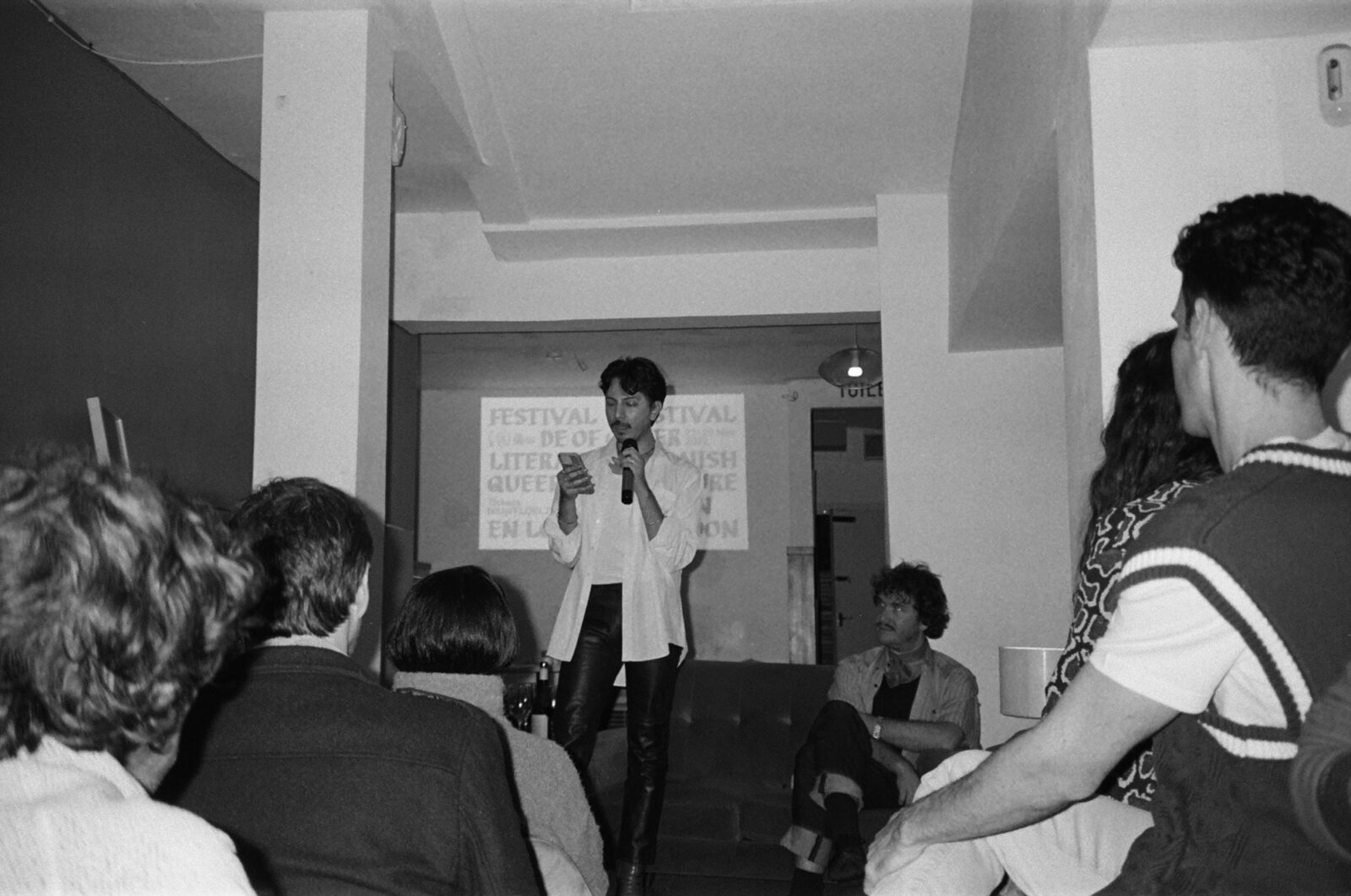 Romancero Books works because its essence is to sell and talk about Spanish literature in the UK. When I talk about the Spanish language, we need to be open-minded and think about literature written and published in Latin American countries as well as literature written in Basque, Catalan, or Galician, in fact I always mention that we sell literature published in the Spanish state and not in Spanish. Coming back to your question, writers and publishers accept the invitations to be part of the talks, events or the festival because for them it’s about opening the doors of their books, UK publishers and at the end, it’s about sharing their way of thinking and how they see the world.
Romancero Books works because its essence is to sell and talk about Spanish literature in the UK. When I talk about the Spanish language, we need to be open-minded and think about literature written and published in Latin American countries as well as literature written in Basque, Catalan, or Galician, in fact I always mention that we sell literature published in the Spanish state and not in Spanish. Coming back to your question, writers and publishers accept the invitations to be part of the talks, events or the festival because for them it’s about opening the doors of their books, UK publishers and at the end, it’s about sharing their way of thinking and how they see the world.
When it comes to queerness, we tend to think that places like London and other big capital cities are safer places for LGBTQI+ identities to live and develop their stories, and articulate the problems they usually face. Do you think it is easier to create a festival on queer literature in London than in other cities, for that matter?
I live in London and this is the main reason why the festival happens here, and I live here because this city is in fact an open place, full of different voices and people. But I won’t say London is safer than other places around the world only because it is a global city. Here too there are homophobic attacks happening more often than what we think or read in the news. We assume big cities are more open-minded but sometimes it’s very surprising to learn how other smaller towns are more ahead of the main cities. There is a town in the UK called Hebden Bridge known as the lesbian capital of the UK and its population is 4,500 people. Saying this, I can’t deny that organizing the festival in London makes sense because here is where the potential readers and public to attend the events live.
Many Spanish-language writers not only expose the difficulties of being and feeling different in a heteronormative world, but these issues intersect directly with colonialism. It is inevitable to think about how this exercise develops within the festival in a place like England, as in some way it is contributing to anti-colonialism and privilege. As a Spaniard living in England, what has your experience been like since you moved there?
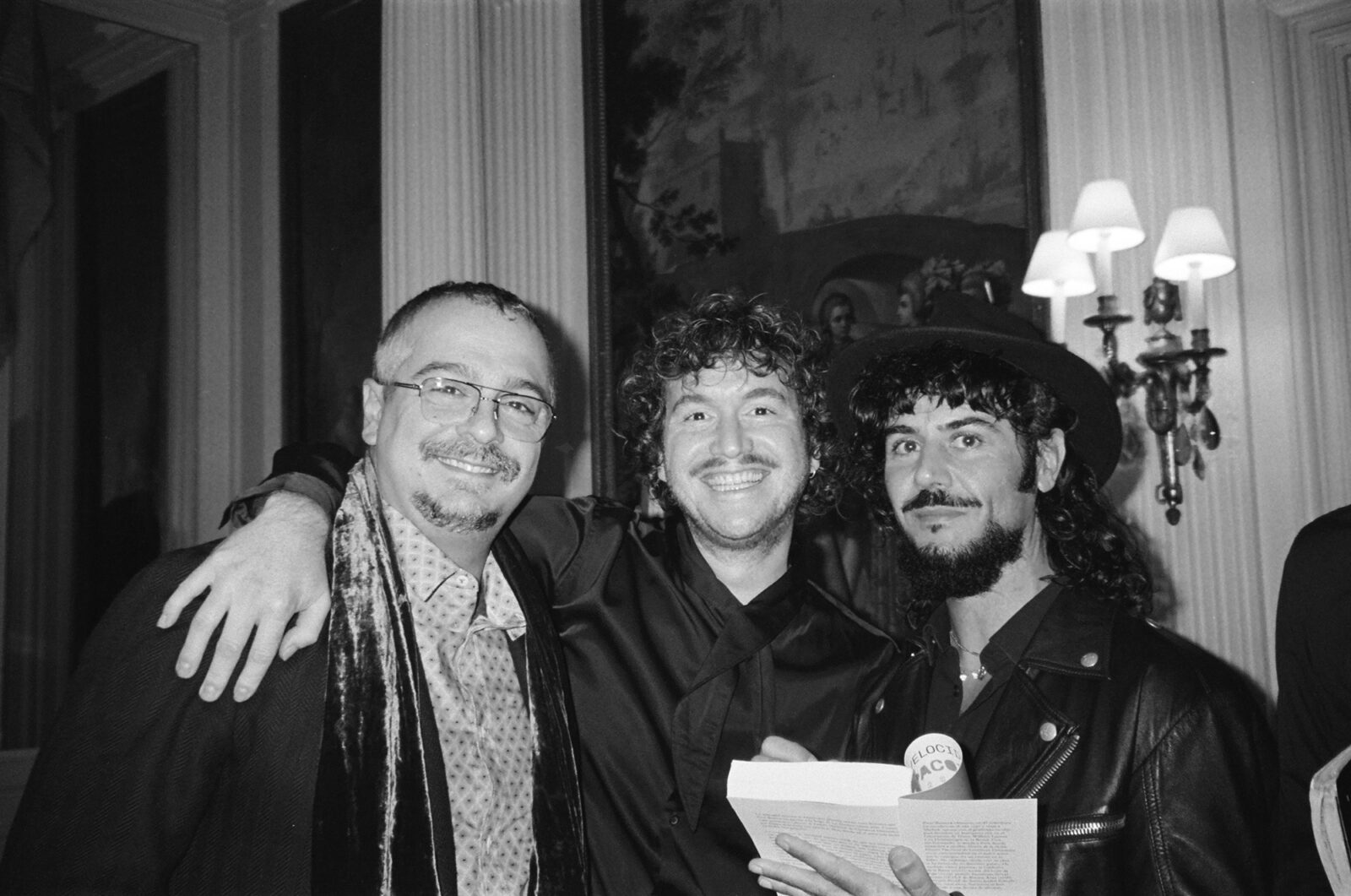 I’ve been living in London for 13 years, and as said before this is a very welcoming city I’ve never had issues with my homosexuality at my various jobs. But let’s not forget that this country is the master of colonialism and it is not outspoken much yet or as much as it should be. One of the many reasons why I decided to organise the festival was to give room for our own queer literature; look around and you won’t find many literary festivals around the world, traditionally mainstream literature festivals dedicate one or two events to LGBTQI+ literature. Another reason is that I grew up without the possibility of reading queer literature, I didn’t have those referents I needed to turn to. After so much work done by society and institutions, we can now find books that tell our stories, our feelings, our realities, and desires in mainstream bookshops. And I am talking about bookshops in Spain and also the ones in England.
I’ve been living in London for 13 years, and as said before this is a very welcoming city I’ve never had issues with my homosexuality at my various jobs. But let’s not forget that this country is the master of colonialism and it is not outspoken much yet or as much as it should be. One of the many reasons why I decided to organise the festival was to give room for our own queer literature; look around and you won’t find many literary festivals around the world, traditionally mainstream literature festivals dedicate one or two events to LGBTQI+ literature. Another reason is that I grew up without the possibility of reading queer literature, I didn’t have those referents I needed to turn to. After so much work done by society and institutions, we can now find books that tell our stories, our feelings, our realities, and desires in mainstream bookshops. And I am talking about bookshops in Spain and also the ones in England.
Living in London had some pros and cons;
I moved here as a member of the European Union and that had some privileges that others coming from other countries in the world didn’t and still don’t have. There are queer people asking for asylum in England coming from countries that were colonised by the UK and these people will tell you a completely different story from mine. In the end, we Europeans (I’m talking generally although there are always exceptions) had some privileges coming here over others, because regardless we came here to find ourselves, freedom or opportunities, we didn’t come here because our lives were at threat.
In this sense, it is interesting to also investigate the relationship between Spain and other Spanish-speaking countries in South America. The main aim of Bienalsaur, the International Biennial of Contemporary Art of the South, is to “look to the south, from the south.” How is this introduced into the discourse of the festival?
I’m glad to be asked about this. In the bookshop and in the festival, as I mentioned before, we sell, talk, and promote literature written in Spanish from any Spanish-speaking country. We had a very interesting discussion about the name of the festival with two poets who were invited to this edition, they mentioned that the official name Festival of Queer Spanish Literature in London could be renamed as Festival of Queer Literature in Spanish in London. This suggestion was taken in place and the name has been modified for future editions.
Apart from this, in both editions we invited writers from both sides of the Atlantic; last year we talked with Camila Sosa about her book Las Malas, or we had a poetry reading with an Argentinian poet based in London Leo Boix. This year we invited Katya Adaui from Peru, Ariel Florencia Richards, Natalia Figueroa and Sofia Vaisman, all of them from Chile. I would like, and this is one of the aims for future editions, to invite more writers from Latin America but to make this happen, I also need the support of their institutions and organizations.
In this last edition Ariel Florencia Richards participated in a talk on her latest book, Las olas son las mismas, which is interesting for how it goes through literary formats and breaks the norm beyond identity. But also, Bigoteando and Popy Blasco talk about something key in the development of gay male sexuality such as cinema. Manuel Puig and Terenci Moix were present as two figures to admire, as well as Boulder, the novel by Eva Baltasar that narrates what it is like for two women to live together in a non-male family. The festival manages to encompass the majority of queer identities. How is the programme created?
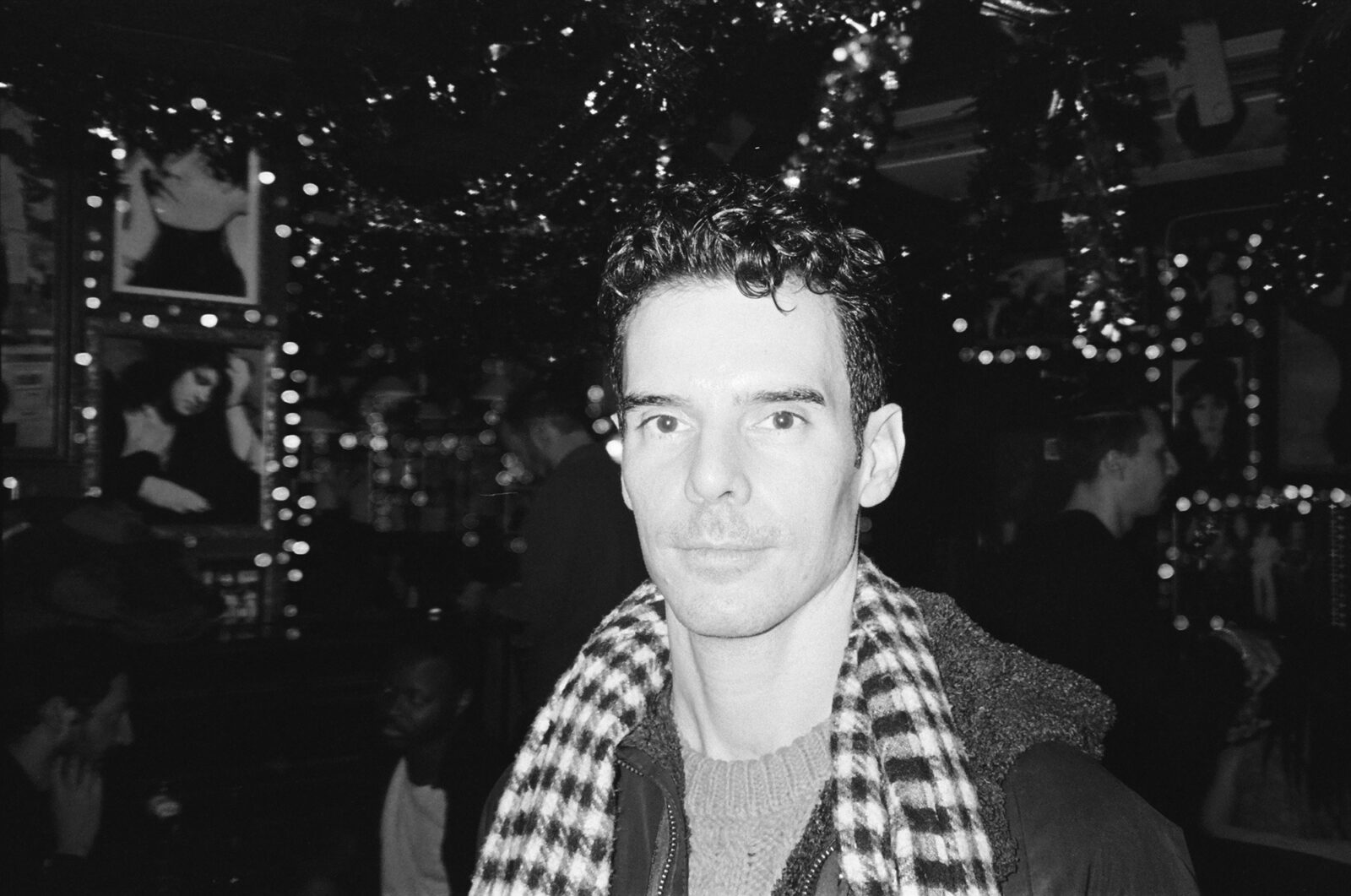 I select what I think is relevant for the festival, for the festival’s audience, and what it really needs this space to be used as a platform to be seen, discussed and promoted. Each edition of the festival has different objectives, the ones for this edition were to promote Spanish LGBTQI+ studies in the UK, to share the latest queer literature written by Spanish and Latin American writers in the UK, to remember the roots of queer writing and support the recovery of writers who were subject to censorship and suppression, and to support new voices in queer poetry and queer theatre. But also to build connections between British readers and queer literature written in Spanish and Catalan by promoting their English-language translations, and to build relations between Spanish writers and editors and their British colleagues for potential future literature translations.
I select what I think is relevant for the festival, for the festival’s audience, and what it really needs this space to be used as a platform to be seen, discussed and promoted. Each edition of the festival has different objectives, the ones for this edition were to promote Spanish LGBTQI+ studies in the UK, to share the latest queer literature written by Spanish and Latin American writers in the UK, to remember the roots of queer writing and support the recovery of writers who were subject to censorship and suppression, and to support new voices in queer poetry and queer theatre. But also to build connections between British readers and queer literature written in Spanish and Catalan by promoting their English-language translations, and to build relations between Spanish writers and editors and their British colleagues for potential future literature translations.
I tried to curate a programme as diverse as the queer society is, I don’t want to say I choose a writer or a book or a publisher to fit them in at any of the letters of the LGBTQI+, but it is important for me at least to use this manifesto, the festival, as a global representation. When you curate, program or select a list of names for any festival, you have a social responsibility to englobe as many different voices as possible; you can also be a facilitator for a change.
This year you have had the chance to produce a festival with both online and in-person activities. Is this hybrid structure working well? Do you plan to maintain it for further editions?
Definitely yes. The first edition was only online for pandemic reasons and the lesson learned with the latest edition and with the previous one is that not everyone who lives in big cities or even living in them is able to attend live events at a specific date and time. Online events, and the ones from this festival are available until January 6th, making them possible to be enjoyed over the Christmas holidays. Podcast episodes and pre-recorded talks are here to stay with us and I advocate for them in future festival editions.
It is also interesting to see the role of translation in an event like this. It is good to translate some of the content into English but also keep the Spanish speaking nature of it in order to captivate Spanish-speaking audiences. What is the best way to work both languages in such an event in which, I suppose, another goal is to reach non-Spanish speakers?
Our four live events were in English because we tried and we managed to get spectators who were not only Spanish speakers. The poetry reading was in Spanish, English and Basque and the ones who did not understand one part never complained and actually felt happy and honoured to have the opportunity to listen to another language that wasn’t English. The opening event was in both Spanish and English, with Paco’s answer being translated and interpreted into English by Jaime del Fresno. One of our online talk was in English because the interview was about the publication of the book in English – Here be Icebergs by Katya Adaui. All three podcasts were in Spanish, but another aim of the third edition is to programme podcasts in English too.
There is also room for the intersection with other arts such as performing and contemporary arts, both Joan Daròs and Joaquin Garcia Martin. Why was it important to include these other applications of literature?
Joan came to talk about his debut novella A mordiscos la orquídea and this talk was part of the queer poetry reading and book launches evening. I would say that all the guests who were there that evening were performing, as we arranged the space as a talk show with a sofa, drinks and me interviewing the writers.
Regarding Joaquin’s lecture, I fell in love with the show he curated at CentroCentro last year, and my intention was to bring the exhibition to London and launch the book/catalogue alike here. It is extremely important to talk about Joaquin’s research because then we learnt that way before the current times, the 90’s and the 80’s with La Movida, it was a group of groups of queer people in Madrid 100 years ago that were writing, publishing and living their queer lives as they wanted. This is why one the objectives of this edition was to learn about our queer roots.
Laura Chivite and her book Gente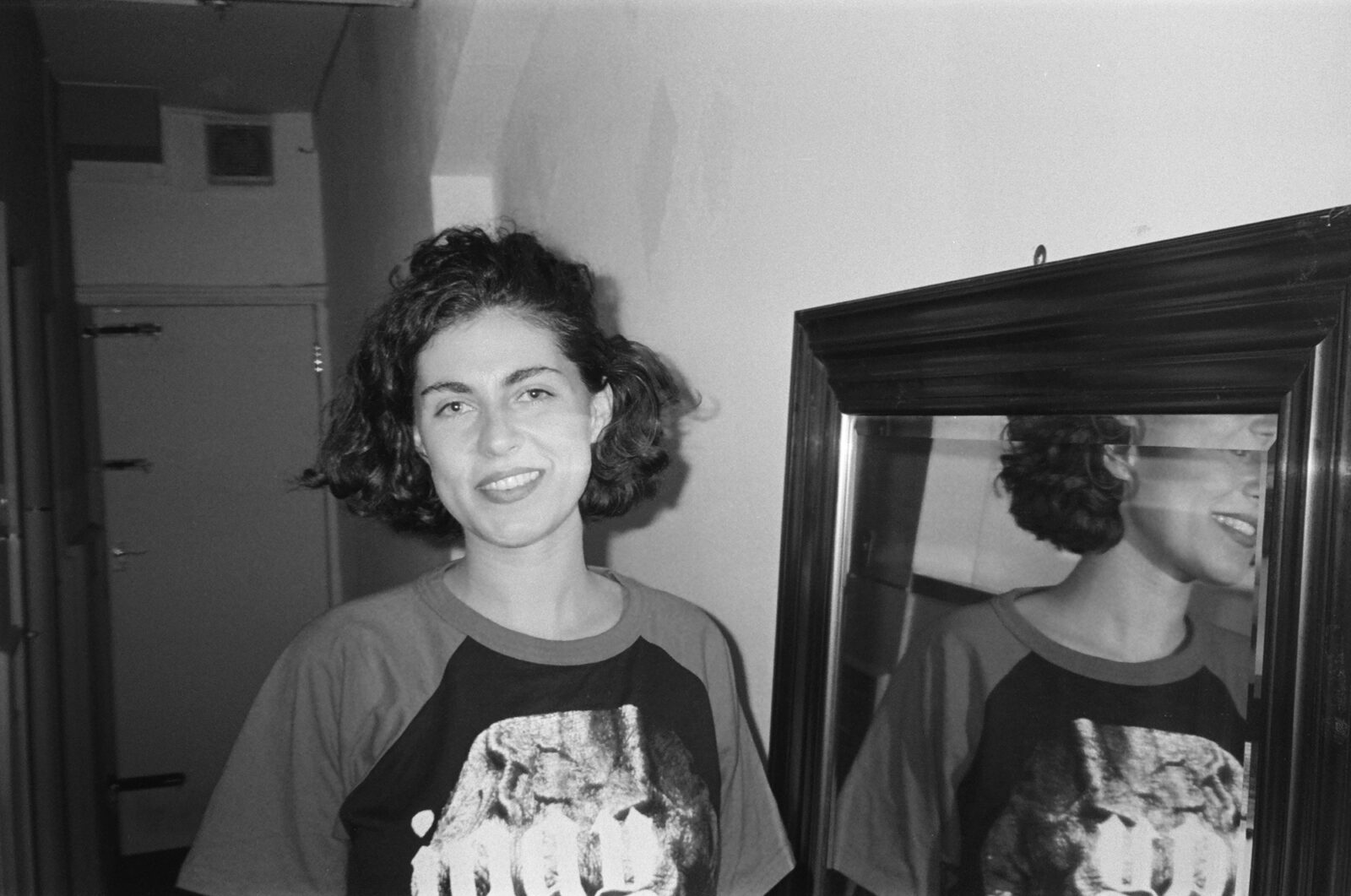 que ríe is definitely a game-changer for this year’s Spanish queer literature. Why was it important to include her on the list of participants?
que ríe is definitely a game-changer for this year’s Spanish queer literature. Why was it important to include her on the list of participants?
A few days after Laura Chivite’s talk at the festival, her book won the Ojo Crítico de Narrativa prize and I couldn’t be happier. I read Gente que ríe during my summer holidays on the beach and it was one of those books that you need to keep reading until you finish. The story starts in 2060 and goes back to 1995, she tells you about a dystopian world that looks more close to the one we are currently living than anything else, you read about the main character Berta but the way we learnt about her identity is through the eyes of the rest of the voices from the story, Laura talks about clinics where you go to des intoxicate from technology among many other brilliant ideas.
Among others, both the Spanish Embassy in London and the Instituto Cervantes collaborate with the festival. How important is it for the development of the festival?
The support of the Spanish Embassy and their Office for Cultural and Scientific Affairs is crucial for the festival because it is our main support. The Cervantes Institute in London collaborated both economically and in kind, meaning they opened the auditorium to host the lecture with Joaquin about Madrid circa 1920. The Cervantes in Manchester and Leeds also supported us economically with two online talks, the one with Ariel Richards and Katya Adaui.
But I also want to show my appreciation and thanks to the rest of supporters and sponsorships of the festival; the Argentinian Embassy in London, Diversitas Institute, Del Canto Chambers, Guernica37, Latin American House, Número de Serie, Latino Life and all the bookstagramers, writers such as Irene Vallejo, Octavia Bright, Foyles Bookshop, Gay’s the Word bookshops and many more for their support.
Paco Bezerra was also at the Festival presenting Velocidad mínima. He was also at the Madrid Assembly the day before after his latest work Muero porque no muero (La vida doble de Teresa) was censored a year ago by the city government. Was this a problem given the institutional support the Festival has?
Not at all, Paco was invited to the festival to talk about his book Velocidad mínima and was interviewed by Isaías Fanlo, professor of Iberian Literary, Gender and Queer Studies at University of Cambridge. His book is a masterpiece and should be read by everyone who want to understand Spanish society for the last 20 years.
The opening of the festival was at the Spanish Embassy in London; an official reception hosted by the Spanish ambassador, with a private audience before the talk followed by an official speech and a formal cocktail reception at the end of the event. The Spanish embassy displayed all their diplomatic power to welcome the II Festival of Queer Spanish Literature in London and the winner of the Spanish Playwriting National Prize 2009, Paco Bezerra. They organised what a writer with the experience and career of his deserves.
What is the future of the festival, and is there anything we can look forward to for the third edition?
After the Christmas break, I will start with the research of books, writers and concepts to talk about in the third edition. Ideas and suggestions are welcome.
But there is one idea that has been floating around my mind recently, and it is to have a dual festival happening in London and the following weekend or month in Madrid, Barcelona or at any other city, can you imagine in Mexico City or in Buenos Aires? For this idea, obviously, I need a bigger budget – hello private sponsors!
Finally, what are the three queer books written in Spanish that you would recommend to our readers?
I will recommend A mordiscos la orquídea by Joan Daròs because it transports you to summer in the Mediterranean coast, to a swimming pool full of champagne rose, it’s sexy, dark and I can only think of Jude Law in the film adaptation.
Una noche mala la tiene cualquiera by Eduardo Mendicutti was written in 1983 and talked about Spaat in that time, the night of the military coup, and allis told from the point of view of a group of drag queens. Last year was the 40th anniversary of the publication and it deserves a groundbreaking welcoming.
Permafrost by Eva Baltasar, it is the first book I read from Eva and is fresh, fun, chaotic and while reading it I thought I was talking with my friends about our lives.


